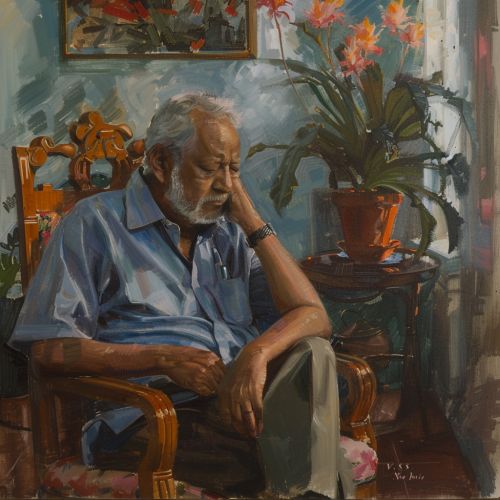V. S. Naipaul
Early Life and Education
Sir Vidiadhar Surajprasad Naipaul, commonly known as V. S. Naipaul, was born on August 17, 1932, in Chaguanas, Trinidad and Tobago. He was the second child in a family of Indian descent. His father, Seepersad Naipaul, was a journalist and aspiring writer, which significantly influenced Naipaul's early interest in literature. Naipaul attended Queen's Royal College in Port of Spain, where he excelled academically. In 1950, he won a scholarship to University College, Oxford, where he studied English literature.
Literary Career
Early Works
Naipaul's literary career began in the 1950s with a series of short stories and his first novel, The Mystic Masseur. The novel, published in 1957, is a satirical look at Trinidadian society and was well-received for its wit and keen observations. This was followed by The Suffrage of Elvira (1958) and Miguel Street (1959), both of which continued to explore themes of post-colonial Trinidadian life.


Breakthrough and Recognition
Naipaul's breakthrough came with the publication of A House for Mr Biswas in 1961. This novel, often considered his masterpiece, is a semi-autobiographical account of his father's life and struggles. The book's success established Naipaul as a significant literary figure. He continued to write prolifically, producing works such as In a Free State (1971), which won the Booker Prize, and A Bend in the River (1979), a novel set in post-colonial Africa that explores themes of political instability and personal dislocation.
Non-Fiction Works
In addition to his novels, Naipaul was a distinguished non-fiction writer. His travelogues and essays, such as An Area of Darkness (1964), India: A Wounded Civilization (1977), and Among the Believers: An Islamic Journey (1981), provide deep insights into the cultures and societies he explored. These works are notable for their critical and often controversial perspectives.
Themes and Style
Naipaul's work is characterized by its exploration of themes such as displacement, identity, and the impacts of colonialism. His writing style is marked by its clarity, precision, and often unsparing honesty. Naipaul's ability to capture the complexities of post-colonial societies and the individual's place within them has earned him both acclaim and criticism.
Awards and Honors
Naipaul received numerous awards and honors throughout his career. In addition to the Booker Prize, he was awarded the Nobel Prize in Literature in 2001. The Nobel Committee praised him for his "incorruptible scrutiny in works that compel us to see the presence of suppressed histories." He was also knighted by Queen Elizabeth II in 1990 for his services to literature.
Personal Life
Naipaul's personal life was as complex as his literary works. He married Patricia Ann Hale in 1955, who played a significant role in his career as his first reader and editor. After her death in 1996, Naipaul married Nadira Alvi, a Pakistani journalist. Naipaul's relationships and personal views often sparked controversy, reflecting the contentious nature of his public persona.
Legacy
V. S. Naipaul passed away on August 11, 2018, in London, England. His legacy is marked by his profound contributions to literature, particularly in the context of post-colonial studies. His works continue to be studied and debated for their incisive exploration of the human condition and the lasting impacts of colonialism.
